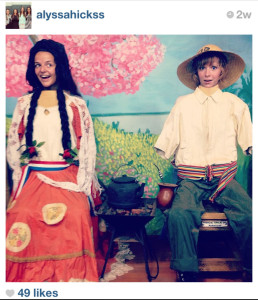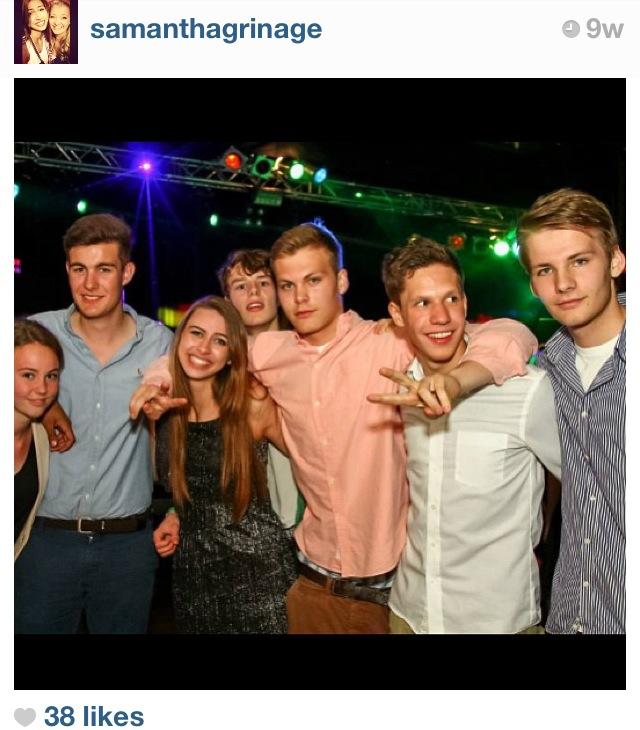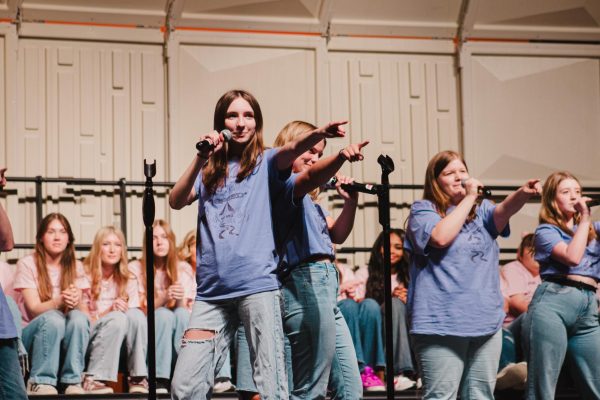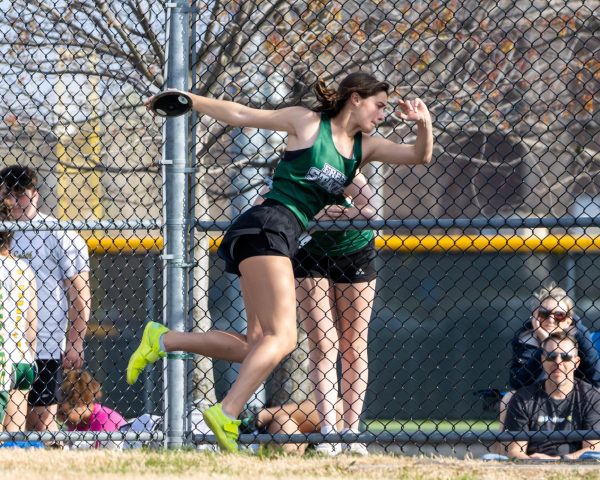Instagram summer @samanthagrinage @alyssahicks
@samanthagrinage:
Stepping off the plane in Germany, junior Samantha Grinage didn’t know what to expect. Upon arriving in Eutin, she was still unsure.
“Eutin at first was really small,” Grinage said, “And I was like, ‘Maybe if you stayed here to live, it might get a little bit boring,’ … But it really grew on me. All the streets were brick, and it was so cute, there were so many old buildings.”
Grinage participated in Lawrence’s “Friends of Eutin” exchange program in Eutin, Germany, one of Lawrence’s sister cities. She spent three and a half weeks of her summer meeting new people, attending a German school and immersing herself in German culture.
“It was a really cool experience just getting to see the culture and the different people,” Grinage said. “They’re a lot more like us than I expected … especially with the teenagers, less so with the adults.”
Prior to visiting Germany, Grinage was misinformed about the attitude of the German teenagers.
“I had been told they were more strict and stern,” Grinage said, “and they don’t like physical contact or like hugging or anything, but the teenagers actually are really similar [to American teenagers] with their sense of humor and the way they interact with each other.”
Once Grinage and the rest of the students arrived in Eutin, they met up with their host families and began going to school.
“There were two schools Weber and Voss,” Grinage said, “And I was at Voss. We stayed with a host family, and we did stuff with them, but there were also planned activities and places we went with the group like Lubeck and Hamburg.”
In Lubeck and Hamburg, the group wandered around looking at churches, taking boat rides on the Baltic Sea, and touring a German Marines base from World War I.
A regular day in Eutin consisted of school from 7:45 a.m. to 1 p.m., then hangout time downtown, lunch, tea time, and dinner. Dinner was served late in the day, so after that, the students went to bed.
Students from Lawrence were also allowed to attend two of the school’s dances, which were quite different from the dances in the states. Grinage and her friends danced to an actual DJ’s music and enjoyed light shows until four in the morning.
“[The dance] was called the Abiball, it was for kids who were taking the Abitur, [a final exam for upper level high schoolers], like the seniors, but they’re actually 13th grade. They served alcohol at them, which was strange, being an American, and not having that be accepted [here]…”
After their time with the host families was over, the students headed to Berlin for half a week.
“We stayed in a youth hostel,” Grinage said. “The first day we got there, actually, we had a street art tour, and that was really cool, and we also toured the Reichstag (German parliament in World War II) building.”
Along with seeing the Reichstag, Grinage also saw historic sites such as Checkpoint Charlie, the former location of the Berlin Wall, and the Brandenburg Gate.
Eutin strongly impacted Grinage. She plans to return someday.
“I would not mind living there and going back and visiting,” Grinage said. “I really want to go back and stay for an extended amount of time because I really fell in love with it.”

@alyssahicks:
From seeing one of the seven wonders of the world to being approached by poor children on the streets, senior Alyssa Hicks had a variety of experiences on her foreign exchange to Paraguay.
The biggest difference was apparent while she attended school in Encarnación, the city she was staying at in Paraguay.
“School, oh God, school was so different,” Hicks said. “You stay in the same classroom the whole day. Our schooling system is a lot more organized and productive, honestly. They get out of school at like 12 … They only go for like four hours.”
Electives and extracurriculars were nonexistent.
“Any interests they have,” Hicks said, “they have to pursue outside of the classroom in like clubs. I felt really bad for them because they come here and they’re like, ‘Oh my God, there’s so many cool classes you can take,’ but [they] just have their basic core classes.”
Teaching styles in Paraguay were also drastically different from what Hicks is used to in Lawrence. Paraguyan students are simply instructed to copy down a lesson from a book every day while the teacher sits and watches.
Hicks not only found school to be atypical, but casual conversation as well.
“They make fun of you without thinking about it,” Hicks said. “They are very honest and upfront with you. They don’t mean to hurt your feelings or anything, but sometimes they can be like, ‘Oh my gosh, your hair looks horrible today,’ they’ll say stuff like that, but it’s not weird for them, so that was kind of unfavorable.”
Paraguayans also don’t follow the same sleep schedule as Americans, and many teenagers enjoy bustling nightlife.
“It’s just kind of like a college town would be,” Hicks said, “There’s always something going on. When I was there … I went to like three birthday parties, and then I went to … an organized party, you had to buy a ticket, and it was a huge deal. They rented out a nice venue.”
Parties in Paraguay last through the entire night and end in the morning.
“We didn’t leave the parties until like 6 a.m.,” Hicks said, “And that’s completely normal. The parents picked us up, … and they were like, ‘How was your party?’ and we’re like, ‘It was good, it’s six in the morning, and I’m really tired.’ … I was just like freaking out because after I got out of the party I was like, ‘The sun is up.’”
Life inside the home also followed a later schedule. Hicks’s family ate dinner around 9:30 or 10 pm. Dinner was followed by more socializing, then finally bed around 12 pm.
In the city, Hicks had to be cautious about what she chose to wear.
“… They are more conservative with the way that they dress,” Hicks said, “So it was like 70 degrees outside, but I had to wear jeans like everyday, and make sure I was covered up.”
While the group was out in the city Hicks noticed several poverty stricken areas filled with beggars.
“Sometimes we would just be driving,” Hicks said, “and we would come to a stop, and there would be kids coming up, asking [us] for money, and we weren’t allowed to roll down the windows or give them anything. That’s just not something you would really see happen here, or at least in Lawrence you wouldn’t, so it was really eye opening.”
Despite all of these peculiar aspects, Hicks managed to have positive experiences.

Her favorite event of the trip was visiting the vast, rushing waters of Iguassu Falls in Argentina.
“I had like an ‘aha’ moment when I was just standing there looking at something so big and beautiful,” Hicks said. “Just like every moment I was there I was just in awe of it.”
Hicks’s time in Paraguay exposed her to a new way of living. She believes that Americans tend to lose focus of the benefits of living in the United States.
“It was probably the best experience I’ve had in my life because it really opened my eyes to another way of living,” Hicks said. “The United States is so big, and we’re in the middle of it, so you don’t really realize how different life could be somewhere else … Once you tell them you’re American, they think the world of you. We kind of get stuck in our little American cocoon sometimes, and don’t really think about what else is going on in the world.”
Your donation will support the student journalists of Lawrence Free State High School. Your contribution will allow us to purchase equipment and cover our annual website hosting costs.








